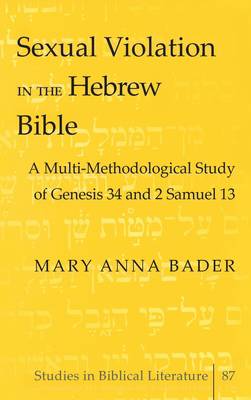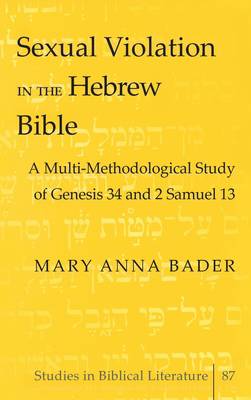
- Afhalen na 1 uur in een winkel met voorraad
- Gratis thuislevering in België vanaf € 30
- Ruim aanbod met 7 miljoen producten
- Afhalen na 1 uur in een winkel met voorraad
- Gratis thuislevering in België vanaf € 30
- Ruim aanbod met 7 miljoen producten
Zoeken
Sexual Violation in the Hebrew Bible
A Multi-Methodological Study of Genesis 34 and 2 Samuel 13
Mary Anna Bader
€ 97,45
+ 194 punten
Omschrijving
Applying diverse biblical studies methodologies, Sexual Violation in the Hebrew Bible, analyzes Genesis 34 and 2 Samuel 13, narratives that contain the sexual violation of a woman. More specifically, this book explores the various contexts in which critical Hebrew words were used and how they have been interpreted. Hebrew Bible laws dealing with rape and other sexual improprieties are addressed. Two aspects of narrative criticism - characterization and rhetoric - clearly show that the maternal brothers of Dinah and Tamar, the violated women, come to the foregrounds of the narratives while their fathers recede into the backgrounds. Their brothers reacted with violence while their fathers responded to the violations of their daughters with silence. Mary Ann Bader considers the implications of these narratives in the current context, citing patterns of student reactions to these texts and teaching opportunities. This book is suitable for biblical studies and women and religion courses.
Specificaties
Betrokkenen
- Auteur(s):
- Uitgeverij:
Inhoud
- Aantal bladzijden:
- 208
- Taal:
- Engels
- Reeks:
- Reeksnummer:
- nr. 87
Eigenschappen
- Productcode (EAN):
- 9780820478739
- Verschijningsdatum:
- 9/03/2006
- Uitvoering:
- Hardcover
- Formaat:
- Genaaid
- Afmetingen:
- 152 mm x 229 mm
- Gewicht:
- 462 g

Alleen bij Standaard Boekhandel
+ 194 punten op je klantenkaart van Standaard Boekhandel
Beoordelingen
We publiceren alleen reviews die voldoen aan de voorwaarden voor reviews. Bekijk onze voorwaarden voor reviews.











